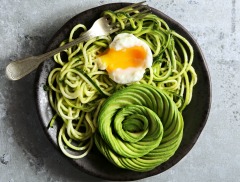Don't just meal plan... meal plan intelligently - with Meal Genius! Sign up for our free newsletter to get delicious recipes, sample meal plans and a whole lot more!
Endive
Endive, a member of the daisy family, is a leafy green vegetable that can be added to salads or cooked like spinach.
A close relative of chicory, there are three main varieties of endive-Belgian endive, curly endive and escarole.
Both curly endive and escarole are used mainly in salads, but can also be briefly cooked and eaten as a vegetable or in soups. Endive is an excellent source of beta carotene and folate.
The Benefits
- Special diets: Autoimmune Paleo Diet, Candida Diet, Diabetic, Elimination Diet, Gluten-Free Diet, Gluten-Free/Dairy-Free Diet, Grain-Free Diet, Low Acid Diet, Low Carb Diet, Low FODMAP Diet, Low Histamine Diet, Low Oxalate Diet, Low Starch Diet, Paleo Diet (Light), Paleo Diet (Strict), PCOS Diet, Pescetarian Diet, Primal Diet, Thyroid Diet, Vegetarian Diet, Whole Food
- Excellent Source of: VitaminA, VitaminK, Folate, Manganese
- Good Source of: Fiber, Potassium, VitaminC
- Preferences: No Fish, No Red Meat, No Pork, No Eggs, No Shellfish, No Gluten, No Nuts, No Seeds, No Soy, No Dairy, No Poultry, No Molds, No Citrus, No Pseudograins, No Coconut, No Nightshade, No Legumes, No Grains, No Corn, No Yeast, No Peanuts, Low Carbohydrate, Low Cholesterol, Low Fat, Low Sodium, Low Sugars, Low Saturated Fat
Related Foods
Related Recipes
Related Nutrients
Selecting and Storing
Choose endive with a fresh, crisp texture and avoid heads with discoloration or insect damage. Store curly endive and escarole, tightly wrapped, in the refrigerator for up to 3 days.









